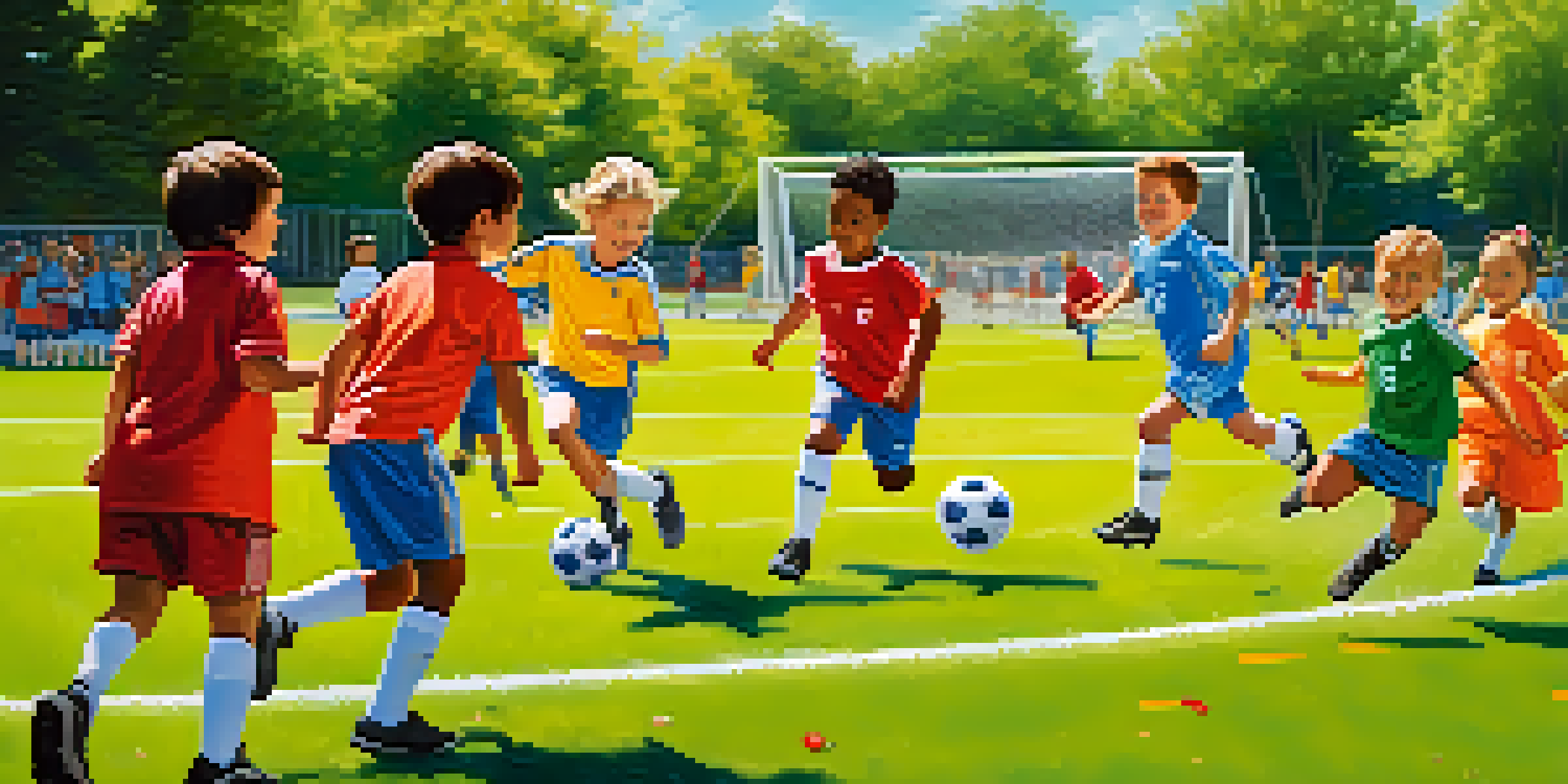Encouraging Team Sports for Kids' Social Skills

The Importance of Social Skills in Childhood
Social skills are essential for kids as they navigate friendships and social interactions. These skills help them communicate effectively, resolve conflicts, and build lasting relationships. Developing social skills early on can set the foundation for positive experiences in school and beyond.
The greatest gifts you can give your children are the roots of responsibility and the wings of independence.
Engaging in team sports provides a practical setting for children to practice these skills. They learn to work together towards a common goal, which fosters cooperation and understanding. This shared experience can help children feel more connected with their peers.
Moreover, social skills gained from sports can translate into other areas of life. For instance, a child who learns to communicate on the field is likely to carry that confidence into the classroom. This cross-contextual benefit is invaluable for their overall development.
Team Sports: A Natural Environment for Interaction
Team sports create a unique environment where kids are encouraged to interact regularly. Whether it’s during practice, games, or team meetings, children must communicate with one another. This consistent interaction helps them develop crucial verbal and non-verbal communication skills.

In sports, kids also learn to read social cues, such as body language and tone of voice. These skills are vital for understanding how others feel and responding appropriately. For example, a supportive pat on the back can boost a teammate's morale, showing kids the impact of positive reinforcement.
Social Skills Fostered in Sports
Engaging in team sports helps children develop essential social skills like communication, conflict resolution, and building lasting friendships.
Additionally, the diverse nature of team sports allows kids to connect with peers from different backgrounds. This exposure broadens their understanding of various perspectives, enhancing empathy and acceptance. As a result, children become more adaptable and open-minded individuals.
Building Teamwork and Collaboration Skills
One of the primary benefits of team sports is the emphasis on teamwork and collaboration. Kids quickly learn that winning requires working together, sharing responsibilities, and supporting one another. This sense of unity strengthens their belief in collective effort.
Teamwork is the fuel that allows common people to attain uncommon results.
Through teamwork, children also learn to appreciate each other's strengths and weaknesses. They understand that everyone has a unique role, whether as a leader, a supporter, or a strategist. This helps them value diversity and recognize the importance of each individual's contribution.
Moreover, the challenges faced during games or practices teach kids resilience and conflict resolution. When conflicts arise, they must find ways to communicate and compromise. These experiences equip them with essential skills to navigate disputes effectively in everyday life.
Developing Leadership Skills on the Field
Participating in team sports provides children with numerous opportunities to step into leadership roles. Whether it’s being a captain or simply taking the lead during practice, these experiences empower kids to express themselves. Leadership in sports fosters confidence and decision-making skills.
As children practice leading their peers, they learn to motivate and inspire others. This skill is not only valuable in sports but also crucial in school projects and future careers. By cultivating their leadership abilities early on, kids can grow into confident adults who can guide and influence others positively.
Teamwork Builds Stronger Bonds
Children learn the value of teamwork and collaboration through sports, appreciating each other's strengths and enhancing their ability to work with diverse groups.
Additionally, kids learn to accept feedback and adjust their styles accordingly. Leaders in sports often receive input from coaches and teammates, teaching them the importance of being open to suggestions. This adaptability is a vital skill in any collaborative environment.
Learning the Value of Sportsmanship
Team sports instill a sense of sportsmanship that goes beyond just winning or losing. Kids learn to respect their opponents, celebrate their successes, and handle defeats gracefully. This sense of fairness is crucial in developing integrity and accountability.
Through sportsmanship, children understand that the journey is just as important as the outcome. They learn to appreciate hard work, perseverance, and dedication, regardless of the final score. This mindset can help them maintain a positive attitude in all areas of life.
Moreover, good sportsmanship teaches kids the importance of empathy and kindness. Recognizing a rival's effort or comforting a teammate after a loss are acts that promote emotional intelligence. These lessons contribute to building well-rounded individuals who thrive in social settings.
Encouraging Friendships Through Team Sports
Team sports naturally foster friendships among children, creating bonds that often last a lifetime. Shared experiences on the field or court lead to camaraderie and trust, helping kids forge meaningful relationships. These friendships can provide emotional support and a sense of belonging.
As children spend time together during practices and games, they engage in conversations that deepen their connections. They share laughs, celebrate victories, and even learn to navigate challenges together. These shared experiences create a strong foundation for lasting friendships.
Sportsmanship Teaches Life Lessons
Participating in team sports instills sportsmanship, emphasizing respect, empathy, and the importance of the journey over merely winning or losing.
Furthermore, participating in team sports encourages kids to socialize outside of practice. They may arrange playdates, attend each other's games, or join social events, enriching their social lives. The friendships formed through sports often extend beyond the field, contributing positively to their overall social skills.
How Parents Can Support Team Sports Participation
Parents play a critical role in encouraging their children to participate in team sports. By showing interest and attending games, they can motivate their kids and demonstrate the importance of teamwork. Active involvement reinforces the value of being part of a team.
Additionally, parents can help by connecting their children with local sports programs. Researching options and enrolling them in teams can provide valuable opportunities for social interaction and skill development. This proactive approach can lead to enriching experiences for their kids.

Finally, fostering a positive attitude towards competition is essential. Parents should encourage healthy competition while emphasizing the importance of enjoyment and growth. This balance helps children appreciate the journey of learning and socializing through sports.